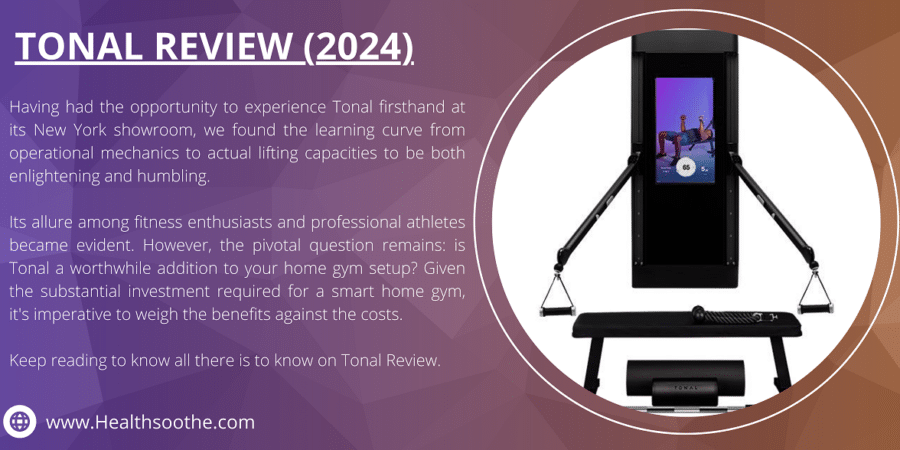In today’s article, we will be diving into all the details of Tonal Review. Tonal, a cutting-edge smart home gym developed by Aly Orady, an innovative engineer hailing from Silicon Valley, emerged from his quest to balance weight loss efforts with demanding work schedules.
Having had the opportunity to experience Tonal firsthand at its New York showroom, we found the learning curve from operational mechanics to actual lifting capacities to be both enlightening and humbling.
Its allure among fitness enthusiasts and professional athletes became evident. However, the pivotal question remains: is Tonal a worthwhile addition to your home gym setup? Given the substantial investment required for a smart home gym, it's imperative to weigh the benefits against the costs.
Delving into a comprehensive Tonal review of its functionality, comparative analysis with other smart gym systems, its target user demographics, and meticulous exploration of its merits and demerits can aid in making an informed decision regarding its suitability for your fitness journey.
Keep reading to know all there is to know on Tonal Review.
About the Tonal Smart Home Gym

Orady's expertise culminated in the creation of Tonal, a fusion of electromagnets and cable machinery, engineered to replicate the dynamics of a traditional weight room coupled with personalized trainer guidance.
Priced at $3,995, Tonal stands out amidst the array of smart home gym offerings such as Mirror and Tempo due to its versatility in replacing multiple strength-training apparatus like dumbbells, barbells, and cable machines.
Notably, its appeal has transcended beyond the fitness realm, garnering recognition from renowned athletes like LeBron James and Serena Williams, who have not only invested in the company but also established partnerships with it.
How Does Tonal Smart Home Gym Work?

Tonal represents an innovative approach to home fitness, offering a compact and vertically mounted gym experience propelled by electromagnets. Its design features two adjustable elongated arms equipped with handles akin to those found on a cable machine.
Positioned adjacent to a sizable touchscreen display, these arms utilize magnets to provide customizable resistance for various exercises, eliminating the need for cumbersome weight storage.
The core objective of Tonal is to consolidate diverse strength training equipment into a single machine, facilitating comprehensive full-body workouts. Augmenting its functionality are 17 distinct sensors meticulously integrated to evaluate user form, technique, and pace, furnishing real-time feedback to aid in self-correction.
Additionally, smart accessories such as handles and bars incorporate gyroscopic motion sensors, seamlessly syncing with Tonal via Bluetooth to meticulously track repetitions.
Setting Tonal apart is its intelligent capacity to discern muscle readiness based on prior workout data, delineating muscle groups into categories of fatigue, recovery, or readiness.
This categorization employs a color-coded system comprising three zones: red indicating the need for rest or mobility exercises, yellow signaling cautious engagement, and green denoting optimal readiness for workout engagement.
Regarding spatial considerations, Tonal ideally requires a 7-by-7-foot area with ceilings measuring 7 feet and 10 inches. Compatibility is optimized for wood or metal walls with stud widths ranging from 16 to 24 inches; however, verification is essential for walls constructed from alternative materials like concrete or plaster, ensuring a thickness of 1.25 inches or less.
Installation prerequisites include proximity to a power outlet within 6 feet and a robust Wi-Fi connection. Professional installation by Tonal's technicians is mandatory, ensuring seamless setup and functionality. Relocation services are available at an additional charge to accommodate moving scenarios, covering disassembly and reinstallation procedures.
How Did We Test the Tonal Smart Home Gym?
Assessing cutting-edge fitness equipment can be quite time-consuming, necessitating a comprehensive exploration of its myriad features, acclimating oneself to its operation, and identifying areas for potential enhancement.
During the evaluation of Tonal, we engaged in a variety of strength training exercises, akin to those performed on conventional equipment, to ascertain the comparative experience and level of challenge. Additionally, we delved into Tonal's class offerings and completed its preliminary strength assessment.
Key aspects under scrutiny encompassed:
- User-Friendliness: Evaluation of the touchscreen's intuitiveness, ease of accessing classes, and overall equipment operability.
- Material Quality: Scrutiny of the machine's construction robustness and durability under sustained use.
- Pricing Structure: Detailed examination of included features vis-à-vis optional extras, discerning the value proposition.
- Target Demographic: Identifying the primary beneficiaries of Tonal's features and capabilities.
- Competitive Distinction: Analysis of Tonal's unique selling points in comparison to other smart gym alternatives.
Tonal Review - Experiencing Tonal Smart Home Gym

With approximately decades of weight training under our belt, we consider ourselves well-acquainted with various exercises and their proper execution. This familiarity heightened our curiosity to delve into the world of Tonal.
Initial encounters with Tonal's smart screen can be somewhat overwhelming due to the plethora of programs and options presented. Our journey commenced with Tonal's strength assessment feature, aimed at tailoring weights to individual exercises.
Guided by a showroom trainer, we underwent a series of assessments, including deadlifts, bicep curls, and squats, among others. While our interaction occurred in demo mode, post-assessment, Tonal typically retains and adjusts exercises based on personalized metrics.
Attaching the handle accessories involved twisting T-locks onto Tonal's arms, ensuring secure fixation during workouts. Before employing any smart accessory, affixing the control clip, a small gray plastic cover facilitating motion detection, was imperative.
Repeatedly attaching and detaching the control clip for multiple accessories during workouts could prove tedious, albeit necessary. This additional step, absent in traditional cable machines, warrants attention.
Capable of delivering up to 200 pounds of resistance, Tonal offers a formidable challenge, surpassing conventional dumbbells by negating reliance on gravitational momentum. Our endeavors revealed a surprising level of difficulty, particularly evident during bicep curls, where Tonal demanded a recalibration of effort compared to free weights.
While deadlifts posed a greater challenge, Tonal's ability to refine your form with each repetition proved invaluable, heightening engagement with targeted muscle groups. Additionally, exercises such as lat pulldowns and standing chest flys invoked a sense of familiarity akin to cable machine routines.
Tonal boasts a diverse array of live and on-demand classes encompassing over 60 programs and 1,000 guided workouts, catering to varying proficiency levels. With a cadre of 14 coaches, including offerings spanning yoga, HIIT, Pilates, and more, Tonal endeavors to provide a holistic fitness experience.
Dynamic weight modes such as Spotter, Burnout, Chains, Eccentric, and Smart Flex further augment workout intensity, mirroring personalized training under the guidance of a professional.
The integration of an accompanying app facilitates seamless workout management, ensuring continuity beyond the physical confines of the machine. Notably, certain exercises such as pull-ups and hip thrusts are incompatible due to hardware limitations. However, Tonal seeks to emulate movement patterns through alternative exercises, albeit with nuanced variations.
Participation in an upper body and core class, spanning no more than 20 minutes, offered insights into Tonal's operational intricacies. The need to interchange attachments and adjust resistance levels on the screen initially posed challenges, exacerbated by the constraints of demo mode.
Ownership of a Tonal machine streamlines this process, with personalized weight settings facilitating automatic adjustments between exercises. In essence, Tonal represents a paradigm shift in home fitness, offering a multifaceted approach to strength training coupled with intuitive technological integration, albeit with certain limitations inherent to its design.
So, What are the Pros and Cons of Using Tonal Smart Home Gym
The Pros (What We Liked About It)
- This compact device enhances the aesthetic appeal of any living room or bedroom.
- Enhance your exercise form and receive valuable feedback.
- It is a space-saving machine that doesn't look like an eyesore, even if it is installed in a living room or bedroom.
- Its quiet operation is beneficial, particularly for individuals residing in apartments or shared living spaces.
- You can connect your Amazon Music or Apple Music account and listen to your beats during your workout.
- You have the flexibility to utilize the machine independently, without the need to attend a class.
The Cons (Not Major Issues)
- The high price tag might be a deterrent, compounded by the fact that not all accessories or installation costs are included.
- Installation could pose challenges, especially in confined spaces.
- Adjusting the arms for a comprehensive body workout might prove time-consuming.
- Your walls have to meet the requirements to install Tonal. We ran into this issue because we live in a prewar building, and our walls were too thick to detect the studs properly. The other option is to have a stud build-out, which requires working with a professional contractor and takes up more time and money.
What’s the Cost of Tonal Smart Home Gym?
As for pricing, Tonal Smart Home Gym is priced at $3,995 plus tax upfront, with an alternative payment plan of $84 per month for 48 months. This purchase encompasses a 30-day trial period and a three-year limited warranty.
There's also an optional smart accessories bundle priced at an additional $495, facilitating a broader range of workouts through supplementary equipment like smart handles, a smart bar with Bluetooth functionality, rope, bench, foam roller, and workout mat. Standard purchases include two handles unless the bundle is opted for.
Furthermore, ancillary costs such as installation, shipping, and a Tonal membership are additional considerations. While delivery and installation services are accessible nationwide, associated expenses vary by location.
The Tonal membership, mandatory for the initial 12 months post-purchase, is priced at $60 per month. This membership furnishes unlimited accounts for household members, granting access to a plethora of workouts and personalized features.
After the initial year, members have the choice to renew or utilize Tonal as a standalone machine, albeit preceding access to the extensive library of on-demand classes—an integral facet of Tonal's appeal.
Comparison of Tonal Smart Home Gym with Other Smart Home Gyms

While options like the Mirror, Tempo, and NordicTrack Vault offer strength training and diverse classes, Tonal stands out with its unique feature of digital weights, a capability unmatched by its competitors. Despite being the priciest among them (with the Mirror being the least expensive, priced $1,000 lower), Tonal justifies its cost with a more extensive set of features.
It's challenging to directly compare Tonal with other leading smart home gyms due to its advanced functionalities. Its ability to assess fitness levels and detect muscle readiness revolutionizes the workout experience. Additionally, its capability to identify workout intensity and adjust accordingly is commendable.
However, each smart gym offers its unique advantages. Those seeking to see their form alongside the instructor may prefer the Mirror or NordicTrack Vault. Alternatively, for those averse to wall mounting, the Tempo provides a more suitable option. Similar to Tonal, Tempo employs 3D sensors to correct form.
Final Words on Tonal Review
In conclusion, Tonal may not cater to everyone. While it accommodates beginners and assists with form correction, the steep price tag of over $3,000 might deter novice fitness enthusiasts. However, Tonal represents a dream investment for seasoned weightlifters with a penchant for technology.
Given the luxury of owning a high-tech fitness machine doubling as a personal trainer, the price point may be justified, potentially even surpassing the cost of exclusive personal training sessions.
Ultimately, the decision hinges on individual fitness experience, budget, and willingness to adapt to comprehensive strength training on a single machine.
Furthermore, consideration should be given to the prospect of returning to conventional gyms. For those enamored with at-home workouts, forsaking gym memberships indefinitely, investing in a premium smart home gym like Tonal is a prudent long-term alternative.
Alright, that is all for now on Tonal Review. I hope this article on Tonal Review has informed you on all there is to know about the Tonal Smart Home Gym.



